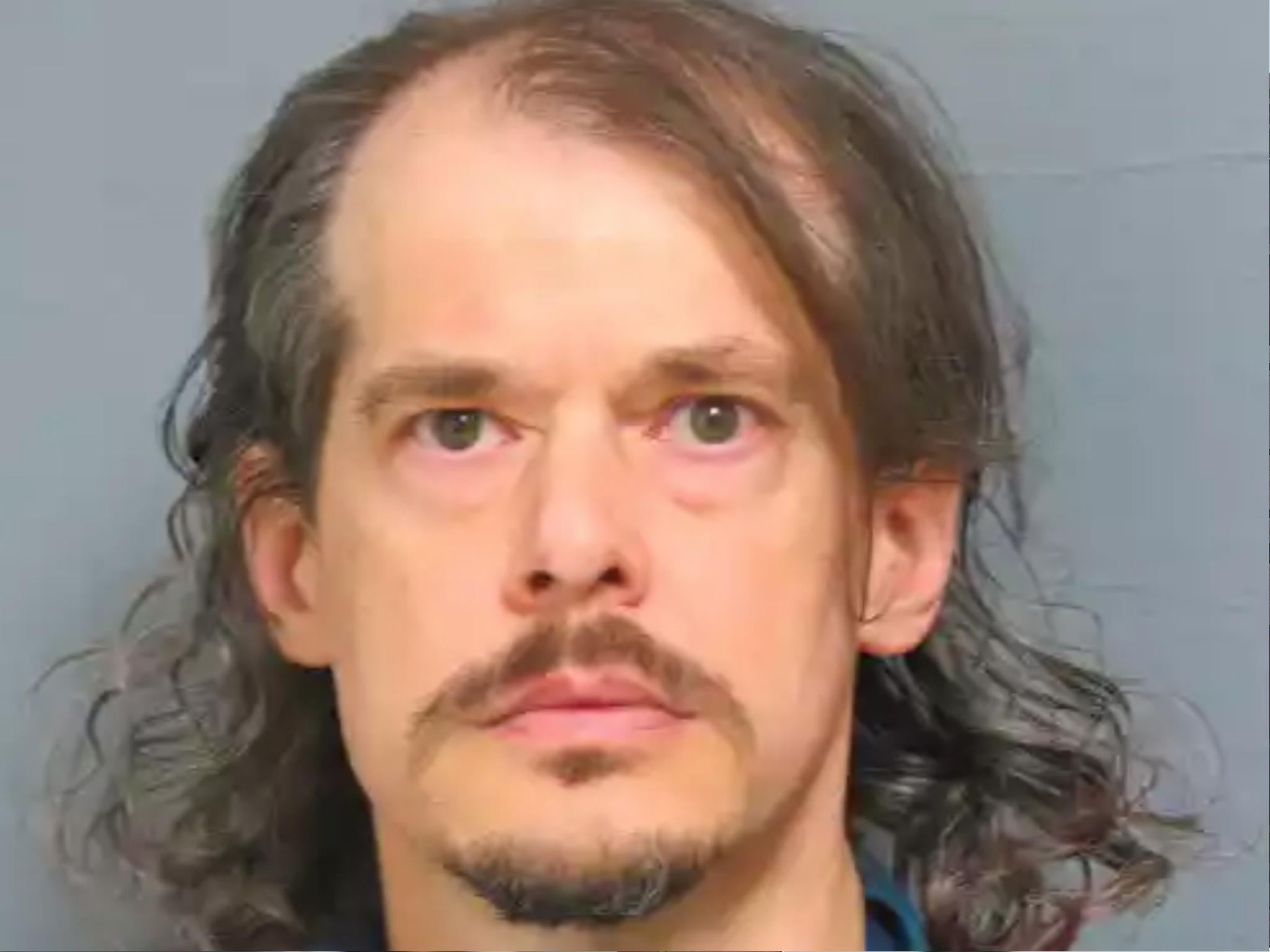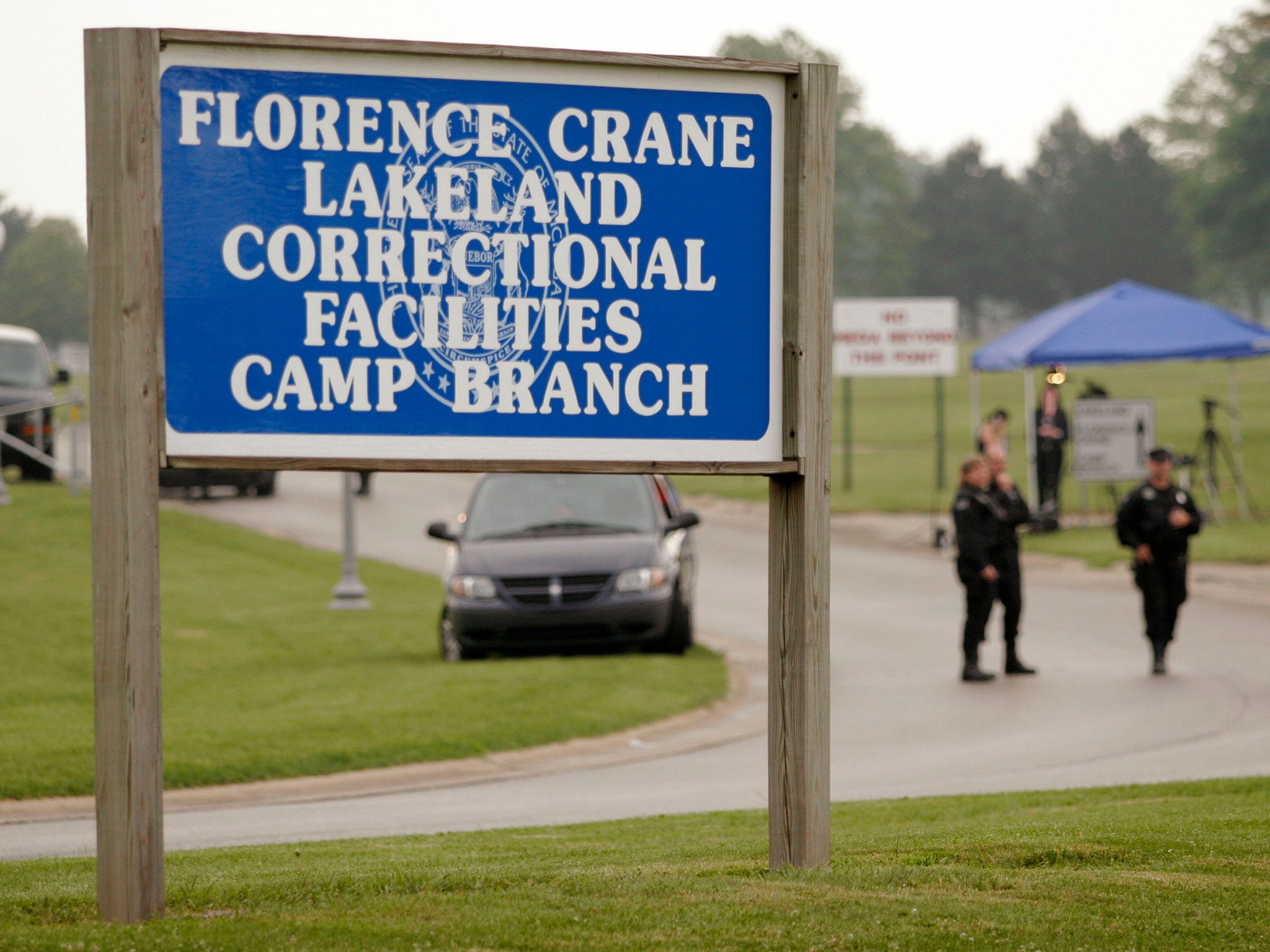Prisoner Curtis Dawkins landed a book deal and now the state wants him to pay for his imprisonment
The fiction writer who is serving a life sentence for murder says his children shouldn’t have to pay for his sins

Your support helps us to tell the story
From reproductive rights to climate change to Big Tech, The Independent is on the ground when the story is developing. Whether it's investigating the financials of Elon Musk's pro-Trump PAC or producing our latest documentary, 'The A Word', which shines a light on the American women fighting for reproductive rights, we know how important it is to parse out the facts from the messaging.
At such a critical moment in US history, we need reporters on the ground. Your donation allows us to keep sending journalists to speak to both sides of the story.
The Independent is trusted by Americans across the entire political spectrum. And unlike many other quality news outlets, we choose not to lock Americans out of our reporting and analysis with paywalls. We believe quality journalism should be available to everyone, paid for by those who can afford it.
Your support makes all the difference.In the summer of 2016, Curtis Dawkins, a criminal who is serving a life sentence in Michigan for murdering a man during a botched robbery, got some unexpected good news. Scribner, one of the top publishing houses in the US, wanted to publish his debut collection of short stories, and offered him $150,000.
Dawkins was stunned. He had been in prison for nearly 12 years, and had been writing fiction as a form of escape, but never anticipated that a major publisher would take him on. When The Graybar Hotel came out last summer, he was praised as a gifted stylist whose stories illuminated the often overlooked lives of prisoners. The book was also a boon for his family: Dawkins directed the money into an education fund for his three children.
But his surprising literary debut also caught the attention of Michigan’s attorney general, who now wants Dawkins, 49, to use his financial windfall to pay for his imprisonment.
The Michigan treasury department is seeking 90 per cent of Dawkins’ assets, including “proceeds from publications, future payments, royalties” and the money that his family puts in his prison account. The state’s complaint, filed in October, tallied the cost of his imprisonment since 2005 at more than $372,000. A hearing is scheduled in Kalamazoo for Monday.
The complaint, which also names Dawkins’ parents and literary agent, states that Dawkins has no right to transfer the funds to his family.
Dawkins, who cannot afford a lawyer and is representing himself, plans to counter that Michigan law contains a provision stating that the court must consider “any legal and moral obligation” that the defendant has to support children or a spouse.
In a telephone interview from Lakeland Correctional Facility in Coldwater, Michigan, Dawkins says his family is being unfairly punished. “It hurts my kids,” he says. “I did wrong, but those kids are completely innocent.”
In the acknowledgments in his book, Dawkins describes the guilt and sadness he has lived with after the murder, and refers to his writing as “a lifeboat”. But his literary success has been clouded by his dark past, and some have questioned whether he deserves a book deal. In an interview with The New York Times for an article about Dawkins, Kenneth Bowman, the brother of the victim, said he thought Dawkins shouldn’t be able to write and publish from prison, and that any money he receives should go to the victim’s family or a charity.
Within a few months of The New York Times article, a headline in The Detroit News asked whether Dawkins should be allowed to profit from tragedy. Not long after that story appeared, Dawkins received the court summons, demanding partial “reimbursement to the state for defendant’s cost of care while incarcerated”.

Michigan is one of more than 40 states where prisoners can be forced to pay for the cost of their imprisonment, according to the Brennan Centre for Justice at the New York University School of Law. Laws that allow the government to charge prisoners “room and board” or “cost of care” fees have proliferated in recent decades, as states charge prisoners and parolees for everything from medical care, clothing and meals to police transport, public defence fees, drug testing and electronic monitoring.
Since so many prisoners are impoverished to begin with, states typically don’t raise much money by charging prisoners room and board fees, and in some states, the enforcement of these laws is conditional on the prisoner’s ability to pay. But as the cost of mass imprisonment has soared, with more than 2.2 million adults in prisons and jails across the United States, some states have grown more aggressive in seeking money from prisoners and formerly imprisoned people.
During the last fiscal year, Michigan collected some $3.7m from 294 prisoners, who account for just a fraction of the state’s nearly 40,000 prisoners. Across the US, some 10 million people owe $50bn in fees stemming from their arrest or imprisonment, according to a 2015 Brennan Centre report.
States often take a percentage of the earnings prisoners receive through prison work programmes. But some states have also sought money from prisoners who have received larger sums, through an inheritance or legal settlements or, as in Dawkins’ case, money that they acquire through their own initiative. After an Illinois prisoner who was serving a 15-month sentence for a drug conviction received a $31,690 settlement for his mother’s death, he was forced to pay the state nearly $20,000 for the cost of his imprisonment, leaving him nearly destitute when he was paroled in 2015.
In Florida, a convict named Jeremy Barrett who received a $150,000 settlement from the country’s corrections department, after he was attacked in 2011 by another prisoner who gouged out his eye, was forced to pay the state nearly $55,000 from the settlement as reimbursement for his three years in prison.
When prisoners and former inmates fight such charges, courts often rule in the state’s favour. In 2000, Connecticut’s supreme court ruled that Eric Ham, who was serving a 50-year sentence for murder, had to pay nearly $900,000 towards the cost of his imprisonment, after he won a settlement of around $1m from the city of New Haven for falsely arresting him for another crime that he didn’t commit.
Proponents of such laws argue that convicted criminals should pay for their own imprisonment when they have the financial means to do so. But some prisoners’ rights advocates say saddling prisoners and parolees with fees can hinder their rehabilitation by making it harder for them to support themselves and their families, and could violate the Eighth Amendment, which bars cruel and unusual punishment and excessive fines.
“To say, you’re not only going to be deprived of your liberty, you’re then going to have to pay for the separation from society, that raises cruel and unusual punishment issues,” says Lauren-Brooke Eisen, senior counsel in the Brennan Centre’s justice programme.
Other legal experts say states should encourage prisoners like Dawkins, who has used his time in prison to do something he finds meaningful, rather than punish them.
“He’s put his talents to productive use in a way that’s making the world a better place,” says Sharon Dolovich, a law professor and the director of the prison law and policy programme at the University of California, Los Angeles’ School of Law. “It’s something that we as a society should be 100 per cent supportive of.”
Dawkins started writing fiction while in higher education, as an English student at Southern Illinois University. He later enrolled in a graduate writing programme at Western Michigan University in Kalamazoo, where he met his partner, Kimberly Knutsen. They moved in together and he became a father to her 3-year-old son. They later had two more children, a son and a daughter.
But Dawkins, who has struggled with addiction and alcoholism since he was 12, slipped back into drug use, and took ketamine and heroin. One October night in 2004, he dressed up in a gangster costume, smoked crack and went on a rampage in Kalamazoo that culminated in a standoff with a six-member SWAT team. After terrorising some partygoers, he shot and killed Thomas Bowman and took Bowman’s roommate hostage. He confessed and was sentenced to life in prison without parole.
After his arrest, he felt suicidal. Then, after about a year, he started writing fiction, which took his mind off his surroundings. His parents, Warren and Arllis Dawkins, sent him a typewriter, and he typed his stories and posted them to his sister, who submitted them to small journals. Many of his stories unfold in jails or prisons, and some draw on his own experiences, while others are surreal and fantastical. Jarrett Haley, the founder of a small literary magazine, Bull, which published Dawkins, helped him assemble and edit a story collection and get a literary agent. His agent, Sandra Dijkstra, sold the collection to Scribner in 2016, and Dawkins split his portion of the advance with Haley, who was instrumental in getting him a book deal.
He had his literary agent send the remainder of the money, a little over $50,000, to a limited liability corporation set up by his parents. Knutsen, who teaches English at Concordia University in Portland, Oregon, says the funds have been used to pay for college and high school tuition, text books, car payments and dental care for their children: Henry, 23; Elijah, 19; and Lily Rose, 17.
After the lawsuit against him was filed, Dawkins’ agent suspended all payments from the publisher, on the state’s orders. (Dawkins was due to receive the final payment from his advance when the paperback edition of The Graybar Hotel comes out this spring.)
The state also froze his prison account, leaving him with a stipend of $25 a month. Previously, his family had been sending about $200 to $300 a month to his account, which he uses to pay for phone calls, emails and snacks and to buy paper for his typewriter.
The attorney general’s office declined to answer questions about Dawkins’ case, and a press secretary said the office “cannot comment on pending litigation”.
Prisoners who publish their writing are legally protected under the First Amendment. But some states have tried to limit prisoner’s ability to publish and get paid for their work. Malcolm Braly, one of the most famous fiction writers to emerge from prison, delayed publishing his 1967 novel, On the Yard, until he was off parole, because officials from the corrections department said publishing the novel would violate the terms of his parole.
In many states, prisoners have also been barred from receiving money for writing nonfiction accounts of their crimes, and money made from such books or film deals gets directed into a fund for victims or their families.
H Bruce Franklin, author of Prison Literature in America, says if prisoners who publish books are forced to forfeit their advances and royalties to the state, it could dissuade aspiring writers who are imprisoned from seeking to publish at all.
“It’s a tremendous discouragement to all the prisoners trying to write, to have a meaningful life when they are in prison,” he says.
Dawkins plans to keep writing. He is currently working on a dystopian novel, set in a huge underground prison in Coldwater, Michigan, where inmates are put into a state of hibernation. He’s more than halfway through it, and hopes to publish it one day.
© New York Times
Join our commenting forum
Join thought-provoking conversations, follow other Independent readers and see their replies
Comments